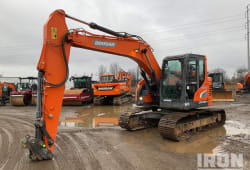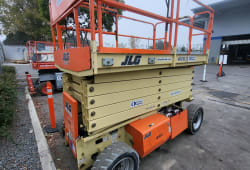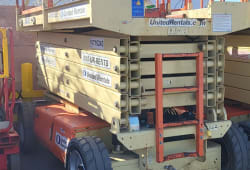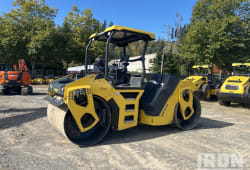Heavy Equipment Warranties: Attract Buyers & Increase Resale Prices
14 Min read
)
August 11, 2023
In the world of heavy equipment sales, warranties play a crucial role in attracting buyers and increasing resale prices. Understanding the importance of warranties and the different types available can give sellers a competitive edge in the market. This article will explore the significance of heavy equipment warranties, the various types of warranties, strategies for attracting buyers through warranties, the impact of warranties on resale prices, and navigating warranty claims and services.
Understanding the Importance of Heavy Equipment Warranties
When it comes to heavy equipment, buyers want assurance that their investment is protected. This is where warranties come into play, providing a safety net for both buyer and seller. A well-structured warranty offers peace of mind, assuring buyers that they will not bear the brunt of unexpected repair or maintenance costs.
But what exactly is covered by a heavy equipment warranty? Let's dive deeper into the topic to understand the various aspects and benefits of warranties in the heavy equipment industry.
The Role of Warranties in Heavy Equipment Sales
Warranties play a vital role in influencing the purchasing decisions of potential buyers. When faced with multiple options, buyers are more likely to choose equipment that comes with a warranty. This is because a warranty provides a level of security, reducing the perceived risk of investing in a particular piece of equipment.
Furthermore, warranties act as a form of insurance, protecting buyers from unforeseen circumstances. Heavy equipment is subject to wear and tear, and unexpected breakdowns can lead to costly repairs. Having a warranty in place ensures that buyers are not left to shoulder these financial burdens alone.
Moreover, warranties signal the seller's confidence in the equipment's quality and reliability. Buyers tend to gravitate towards sellers who stand behind their products, as it suggests a commitment to customer satisfaction and ensures a level of trust in the transaction.
Additionally, warranties often come with additional perks such as access to technical support, discounted maintenance services, and replacement parts. These added benefits further enhance the value of the warranty and make it an attractive proposition for buyers.
How Warranties Increase Resale Prices
When it comes time to resell heavy equipment, having a warranty in place can significantly impact the resale price. Buyers prioritize warranties when evaluating used equipment, as it gives them peace of mind in case any issues arise after the purchase.
A warranty can increase the perceived value of the equipment, making it more desirable to potential buyers. In turn, this demand can lead to higher resale prices, ultimately benefiting the seller. By offering a warranty, sellers can differentiate their equipment from others on the market and attract buyers willing to pay a premium for that added security.
Furthermore, warranties can transfer to subsequent owners, providing an added incentive for buyers to choose a piece of equipment with an existing warranty. This transferability increases the resale value of the equipment, as the new owner can enjoy the same level of protection and peace of mind.
It's important to note that warranties also contribute to the overall reputation of the manufacturer or seller. A company known for providing comprehensive and reliable warranties is likely to attract more customers, leading to increased sales and brand loyalty.
In conclusion, heavy equipment warranties serve as a crucial factor in the buying and selling process. They offer buyers the assurance they need to invest in expensive machinery, while also benefiting sellers by increasing resale prices and establishing trust. A well-structured warranty program can be a win-win situation for both parties involved, creating a smoother and more secure transaction in the heavy equipment industry.
Types of Heavy Equipment Warranties
When it comes to heavy equipment, having a warranty is crucial for protecting your investment and ensuring that any potential issues or defects are addressed. There are several types of warranties available for heavy equipment, each offering different levels of coverage and terms. Familiarizing yourself with these options will help you choose the most suitable warranty for your equipment.
Manufacturer's Warranty
The manufacturer's warranty is typically included with the purchase of new equipment. It provides coverage for a specified period, often ranging from one to three years, depending on the manufacturer. This type of warranty is advantageous for buyers as it assures them that any defects or issues arising from the manufacturing process will be repaired at no additional cost.
Furthermore, a manufacturer's warranty serves as a testament to the equipment's quality. By offering this warranty, manufacturers showcase their confidence in the reliability and durability of their products, which can help build trust with potential buyers.
Extended Warranty
An extended warranty is an additional coverage option that extends beyond the manufacturer's warranty period. Buyers have the option to purchase an extended warranty to further protect their investment and cover potential repairs or maintenance down the line.
For buyers who plan to use the equipment intensively or for an extended period, an extended warranty can be a compelling selling point. It provides an added layer of assurance, giving buyers peace of mind knowing that they are covered even after the manufacturer's warranty expires. Moreover, an extended warranty can increase the perceived value of the equipment, making it more attractive to potential buyers.
Limited Warranty
A limited warranty provides coverage for specific components or parts of the equipment. This type of warranty often comes with certain conditions or limitations, such as a time frame or usage restrictions.
Sellers can customize limited warranties to suit their equipment and address specific concerns that buyers may have when considering a purchase. By offering a limited warranty, sellers can protect key components that are prone to wear and tear or are known for potential issues. This not only instills confidence in the buyer but also demonstrates the seller's commitment to customer satisfaction.
In conclusion, understanding the different types of heavy equipment warranties is essential for both buyers and sellers. Buyers can choose the most suitable warranty to protect their investment, while sellers can leverage warranties as a selling point to attract potential buyers. Whether it's a manufacturer's warranty, an extended warranty, or a limited warranty, having a warranty in place ensures that both parties are protected and can rely on the equipment's performance for years to come.
How to Attract Buyers with Warranties
Now that we understand the importance of warranties, it's essential to explore effective strategies for attracting buyers through warranties:
Marketing Strategies for Warranty Promotion
When promoting heavy equipment, sellers should emphasize the inclusion of a warranty in their marketing efforts. This can be done through various channels, such as online listings, advertisements, and social media platforms.
One effective marketing strategy is to create visually appealing advertisements that prominently display the warranty information. By using eye-catching graphics and compelling language, sellers can grab the attention of potential buyers and pique their interest in the equipment.
Additionally, sellers can leverage the power of social media platforms to reach a wider audience. They can create engaging posts that highlight the benefits of the warranty, such as increased reliability and reduced repair costs. By utilizing targeted advertising on platforms like Facebook and Instagram, sellers can ensure that their warranty message reaches the right audience.
Furthermore, sellers can collaborate with industry influencers or experts to endorse their warranty program. By aligning themselves with reputable individuals or organizations, sellers can build trust and credibility, making their equipment more appealing to potential buyers.
Communicating Warranty Benefits to Potential Buyers
During the sales process, it is crucial to communicate the benefits of the warranty to potential buyers. Explaining how the warranty protects their investment, reduces risks, and provides peace of mind can be a persuasive factor in their decision-making process.
Sellers should take the time to educate buyers about the specific coverage and limitations of the warranty. By providing detailed information, sellers can address any concerns or doubts that buyers may have, ultimately building trust and confidence in the warranty program.
In addition to explaining the immediate benefits of the warranty, sellers should also emphasize any long-term advantages. For example, they can highlight how the warranty can enhance the resale value of the equipment. By assuring potential buyers that the warranty is transferable, sellers can attract those who plan to resell the equipment in the future.
Furthermore, sellers can provide real-life examples or testimonials from satisfied customers who have benefited from the warranty. By sharing success stories, sellers can demonstrate the value and reliability of their warranty program, further enticing potential buyers.
Lastly, sellers should ensure that the warranty information is easily accessible and presented. This can be achieved by creating dedicated sections on their website or product listings that outline the warranty terms and conditions in a user-friendly manner. By making the warranty details readily available, sellers can instill confidence in potential buyers and encourage them to make a purchase.
The Impact of Warranties on Resale Prices
Resale prices can be significantly affected by the presence of warranties. Sellers who can command higher resale prices have leveraged warranties to their advantage:
Warranties play a crucial role in the resale market, especially for heavy equipment. Numerous case studies have shown that heavy equipment with warranties tends to sell at higher prices compared to similar equipment without warranties. This is particularly evident in the used equipment market, where buyers prioritize warranties due to the increased risk associated with used equipment.
These case studies highlight the financial benefits of offering warranties for sellers, as they contribute to higher resale values and potentially faster equipment turnover. When buyers see that a piece of equipment comes with a warranty, they feel more confident in their purchase, knowing that they have some protection against unforeseen issues. This increased peace of mind translates into a willingness to pay a higher price, as buyers perceive the added value that comes with a warranty.
Moreover, warranties provide buyers with assurance that they won't be burdened with unexpected repair costs. This peace of mind can be a decisive factor in their purchase decision, particularly when comparing two similar pieces of equipment. Buyers are more likely to choose the equipment with a warranty, even if it comes at a slightly higher price, as they consider it a wise long-term investment.
Case Studies of Resale Prices with Warranties
Let's delve deeper into some case studies that demonstrate the impact of warranties on resale prices. One such study conducted by a renowned equipment reseller analyzed the sales data of heavy equipment over five years. The study revealed that equipment with warranties consistently sold at prices 15% higher than those without warranties.
Another case study focused on the construction industry, where equipment reliability is of utmost importance. The study found that construction companies were willing to pay a premium for equipment with warranties, as it reduced the risk of unexpected breakdowns and subsequent project delays. In this industry, where time is money, the availability of a warranty can make all the difference in securing a sale.
These case studies not only highlight the immediate impact of warranties on resale prices but also shed light on the long-term benefits for sellers.
The Long-Term Financial Benefits of Warranties
Although offering warranties incur upfront costs, sellers can reap long-term financial benefits. By investing in warranties, sellers can establish themselves as trusted providers of quality equipment, leading to repeat business and positive word of mouth, ultimately contributing to increased profitability over time.
When sellers consistently offer warranties and deliver on their promises, they build a reputation for reliability and customer satisfaction. This reputation attracts more buyers, as word spreads within the industry about the seller's commitment to quality. As a result, the seller's customer base expands, leading to increased sales and higher resale prices.
Furthermore, warranties can significantly shorten equipment downtime. In industries where equipment downtime can lead to substantial financial losses, having a warranty in place ensures that any necessary repairs are promptly addressed. This minimizes disruptions to operations and allows businesses to maintain their productivity levels, ultimately saving them money in the long run.
By investing in warranties, sellers also foster trust and loyalty among their customers. When buyers have positive experiences with equipment backed by warranties, they are more likely to become repeat customers. This repeat business not only generates additional revenue but also reduces the need for extensive marketing efforts to attract new customers. Satisfied customers become brand ambassadors, recommending the seller's equipment to their peers and colleagues.
In conclusion, warranties have a significant impact on resale prices. They provide buyers with confidence, peace of mind, and protection against unexpected costs. Sellers who offer warranties can command higher resale prices, attract more buyers, and build a reputation for reliability. While there may be upfront costs associated with warranties, the long-term financial benefits far outweigh the initial investment.
Navigating Warranty Claims and Services
Once warranties are in place, it is essential to understand how to effectively navigate the claims process and ensure quality service and maintenance:
Warranties play a crucial role in providing peace of mind to buyers. They offer protection and coverage for a specified period, ensuring that if any issues arise with the purchased product or service, the buyer can seek assistance without incurring additional costs. However, simply having a warranty in place is not enough; understanding the claims process and ensuring quality service and maintenance are equally important.
Understanding the Claims Process
Sellers should educate themselves on the claims process outlined in the warranty agreement. By familiarizing themselves with the steps involved, sellers can provide valuable guidance to buyers, ensuring a smooth and efficient experience.
One of the first steps in the claims process is contacting the warranty provider. Sellers should inform buyers about the appropriate channels to reach out to when filing a claim. This may include a dedicated customer service hotline, an online claims portal, or an email address specifically designated for warranty claims.
Additionally, sellers should emphasize the importance of providing all necessary documentation when filing a claim. This may include proof of purchase, warranty registration details, and any relevant receipts or invoices. By ensuring that buyers have all the required paperwork readily available, sellers can help expedite the claims process and minimize any potential delays.
Furthermore, sellers should make buyers aware of any specific timelines or deadlines associated with filing a warranty claim. Some warranties may have strict time limits within which claims must be submitted, and failure to adhere to these deadlines may result in the claim being rejected.
Ensuring Quality Service and Maintenance
While warranties provide coverage for potential issues, buyers need to understand that regular service and maintenance are crucial for maintaining the validity of the warranty.
Sellers should encourage buyers to adhere to recommended service and maintenance schedules provided by the manufacturer or warranty provider. These schedules often include routine inspections, cleaning, and servicing of the product or equipment.
Regular maintenance not only ensures the proper functioning of the equipment but also helps prevent potential issues that may arise. By following the recommended maintenance guidelines, buyers can identify and address any minor problems before they escalate into major issues that may not be covered by the warranty.
Furthermore, sellers should educate buyers about the importance of using authorized service centers or technicians for any repairs or maintenance required. Using unauthorized personnel may void the warranty, leaving the buyer responsible for any associated costs.
It is also beneficial for sellers to provide buyers with information on extended warranty options, if available. Extended warranties can offer additional coverage beyond the standard warranty period, providing buyers with an added layer of protection and peace of mind.
In conclusion, understanding the claims process and ensuring quality service and maintenance are vital aspects of navigating warranty claims and services. By educating buyers and providing them with the necessary information and guidance, sellers can help facilitate a seamless experience, ensuring that buyers receive the full benefits of their warranties.
Conclusion: Maximizing the Value of Your Heavy Equipment with Warranties
Heavy equipment warranties are powerful tools that can attract buyers and increase resale prices. By understanding their importance, offering the right type of warranty, effectively marketing warranties to potential buyers, and providing quality service and support, sellers can maximize the value of their equipment and stay ahead in a competitive market.
Investing in warranties not only benefits buyers by providing peace of mind but also positions sellers as trusted partners, leading to long-term profitability and customer satisfaction. So, when it comes to heavy equipment sales, don't underestimate the impact of warranties - they are a valuable asset that can significantly enhance your business.

Javier Bocanegra is Boom & Bucket's Technical Resolutions Lead, drawing on 10+ years in automotive and heavy equipment to diagnose issues, resolve complex post-sale cases, and keep machines - and customers - running smoothly. A certified heavy-equipment specialist, he's known for meticulous inspections and hands-on expertise across mechanical, electrical, and hydraulic systems. Based in Sacramento, Javier partners closely with buyers, vendors, and our field teams to deliver reliable outcomes and uphold our standards for safety and trust.














